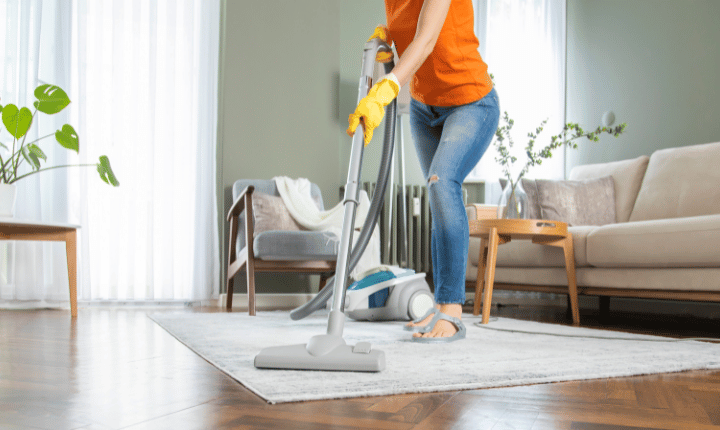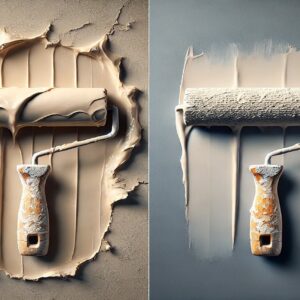Keeping the exterior of our homes clean and well-maintained is essential for both curb appeal and longevity. Vinyl siding, a popular choice for many homeowners, provides a durable and attractive covering for the outer walls. However, dirt, grime, and other unsightly stains can accumulate over time, dulling and wearing your siding. Enter the power of pressure washing, a highly effective method to restore the vibrancy of your vinyl siding. But what if you’re seeking an affordable and eco-friendly cleaning solution? Look no further! In this article, we will share a simple and powerful homemade vinyl siding cleaner specially formulated for pressure washers, allowing you to achieve remarkable results without breaking the bank.
Vinyl siding is known for its low Maintenance. Requirements and longevity are popular for homeowners who desire a beautiful and durable exterior. However, like any surface exposed to the elements, it can accumulate dirt, pollen, mould, mildew, and other stains that can diminish its appearance. While pressure washing is an excellent way to remove these unsightly blemishes, choosing the right cleaning solution is crucial for achieving optimal results.
Why Homemade Cleaners Are Better
Homemade cleaners have gained immense popularity in recent years and for good reason. When maintaining a clean and healthy living environment, opting for homemade cleaners is a superior choice. Unlike commercial cleaners, they do not contain harsh chemicals or toxic additives that can harm the environment and our health. Also, homemade cleaners are highly cost-effective, as the ingredients are affordable and often multipurpose. Making your cleaners saves money and reduces plastic waste by reusing containers.

Furthermore, homemade cleaners offer customization options, allowing you to tailor them to your needs and preferences. Whether it’s a mild cleaner for delicate surfaces or a powerful disinfectant for heavily soiled areas, you can experiment and adjust the formulations accordingly. Ultimately, homemade cleaners provide an effective cleaning solution and contribute to a greener, safer, and more sustainable lifestyle.
Simple Household Items To Make a Solution
Creating a homemade cleaner can be a cost-effective and environmentally friendly solution for everyday cleaning tasks. You can concoct a powerful, versatile, effective, and safe cleaner with just a few simple household items. Common ingredients like vinegar, baking soda, and lemon juice can work wonders when combined in the right proportions. Vinegar, known for its disinfectant properties, can be mixed with water to create an all-purpose cleaner for countertops, floors, and windows. Baking soda, a natural and abrasive deodoriser, can scrub away stains and grime. Adding a squeeze of lemon juice to the mixture enhances the cleaning power and leaves a refreshing scent. By harnessing the power of these everyday items, you can easily whip up your homemade cleaner to tackle various cleaning tasks around the house. 1. Clean countertops and appliances
Step-by-Step Instructions Fr Making and Using The Cleaner
Keeping our living spaces clean is essential for maintaining a healthy environment. One effective way to achieve this is by making and using a homemade cleaner that is both safe and efficient. Follow these step-by-step instructions to create and utilise your cleaning solution.
Following these instructions, you can create an effective, environmentally friendly, and cost-efficient homemade cleaner. Regularly using this cleaner will help you maintain a clean and healthy living space for yourself and your loved ones. Always test the cleaner on a small, inconspicuous area before applying it to larger surfaces to ensure compatibility. Happy cleaning!
Choose The Right Nozzle And Setting.
When cleaning your vinyl siding with a pressure washer, choosing the right nozzle and setting is crucial for achieving the best results. The nozzle you use determines the spray pattern and pressure, while the setting controls the intensity of the water flow. To effectively clean your vinyl siding, opt for a wide-angle or fan nozzle, which provides a broad spray pattern covering a larger surface area. It helps evenly distribute the cleaning solution and effectively rinse dirt and grime. Adjust the pressure setting to a moderate level to avoid damaging the siding or forcing water into gaps and seams. Finding the right balance between pressure and flow will ensure a thorough cleaning without causing any harm to your vinyl siding. Selecting the appropriate nozzle and setting will make a noticeable difference in the outcome of your homemade vinyl siding cleaning with a pressure washer.
Ingredients For The Cleaner:
If you want to make a top-notch homemade cleaner, the key lies in choosing the right ingredients. A truly effective cleaner should be tough on dirt and grime and safe for your health and the environment. One of the most versatile ingredients for homemade cleaners is vinegar. Its acidic nature makes it a powerful agent against stains, bacteria, and odours. Combined with baking soda, another superstar ingredient, you can create a potent scrub that tackles stubborn stains and leaves surfaces sparkling. Essential oils like lemon or tea tree oil add a pleasant fragrance and provide antibacterial properties. Finally, water serves as the base, diluting the ingredients and allowing them to work their magic. By combining these simple but powerful ingredients, you can create your very own homemade cleaner that is both effective and eco-friendly.
Benefits of Using Homemade Vinyl Siding Cleaner
Vinyl siding is a popular choice for homeowners due to its durability, versatility, and low maintenance requirements. However, it can accumulate dirt, grime, and even mould over time, diminishing its appearance and potentially causing damage. While numerous commercial vinyl siding cleaners are available in the market, using a homemade solution can offer several benefits. First, homemade vinyl siding cleaners are typically cost-effective, using common household ingredients like vinegar, baking soda, or dish soap. These ingredients are readily available and affordable, making it a budget-friendly option for homeowners.
Also, homemade cleaners often contain natural ingredients, reducing exposure to harsh chemicals and minimising potential environmental harm. Furthermore, DIY vinyl siding cleaners can be customised to suit specific cleaning needs, allowing homeowners to adjust the formula’s strength based on the level of dirt or stains. By using a homemade vinyl siding cleaner, homeowners can maintain the beauty and longevity of their siding while enjoying the advantages of an eco-friendly and cost-effective solution.
Proper Technique And Safety Precautions
In recent years, there has been a growing interest in using homemade cleaners as -a friendly and cost-effective alternative to commercial cleaning products. However, while homemade cleaners can effectively keep our homes clean and fresh, it’s important to follow proper techniques and safety precautions to ensure their effectiveness and protect ourselves and our loved ones.
First and foremost, it’s crucial to research and understand the ingredients used in homemade cleaners. Common ingredients like vinegar, baking soda, lemon juice, and essential oils are generally safe, but knowing their properties and potential interactions is important. For instance, mixing vinegar with bleach can produce harmful fumes, so avoiding such combinations is essential.
Next, always read and follow the recipe or instructions for your homemade cleaner. Different surfaces may require different cleaning solutions and techniques. For example, a vinegar-based solution may work well on countertops but could damage natural stone surfaces. Using the right cleaner for the specific task and surface is important.
When mixing homemade cleaners, ensure proper ventilation by opening windows or using fans to avoid inhaling excessive fumes. Some ingredients may have a strong odor or release gases during cleaning, so taking precautions to maintain good air circulation is vital.
Protective gear such as gloves and goggles should be worn when using homemade cleaners, especially when handling potentially irritant ingredients or dealing with stubborn stains or ASLO . These protective measures can help prevent skin and eye irritation and safeguard your well-being.
Labelling homemade cleaners is another essential step in maintaining safety. Mark the containers with the ingredients used and the purpose of the cleaner to avoid confusion and accidental misuse. Keep them out of the reach of children and pets to prevent unintended ingestion.
It’s important to remember that while homemade cleaners can be useful, they may only sometimes be as powerful as commercial cleaning products, especially when dealing with stubborn stains or germs. Therefore, if you encounter persistent issues, it’s wise to seek professional advice or consider using commercial cleaning products for those specific cases.
By following proper techniques and safety precautions, we can harness homemade cleaners’ benefits while minimizing potential risks. Homemade cleaners can be a wonderful addition to our cleaning routines, allowing us to create a healthier living environment and contribute to a more sustainable future.
Save money with DIY cleaning solutions.
Cleaning products can be expensive, especially if you constantly restock them. But did you know that you can save significant money by making your DIY cleaning solutions? Not only are these solutions cost-effective, but they also offer a safer and more environmentally friendly alternative to store-bought products. For example, vinegar and water can be used as an all-purpose cleaner, tackling grime and dirt on surfaces. Baking soda, with its natural abrasive properties, is excellent for scrubbing stubborn stains in sinks or bathtubs. By embracing DIY cleaning solutions, you save money and have the satisfaction of knowing exactly what goes into the products you use to keep your home clean.
Conclusion
In conclusion, homemade vinyl siding cleaner for pressure washers is a powerful and affordable solution to maintaining the appearance of your home. Using common household ingredients and a pressure washer, you can easily remove dirt, grime, and stains from your vinyl siding. Not only is this method cost-effective, but it is also environmentally friendly compared to store-bought alternatives. Following the simple steps outlined in this article, you can keep your home looking its best without breaking the bank. So give it a try and see the results for yourself!












Commented Posts